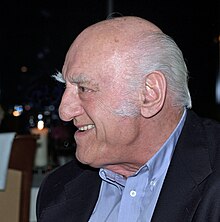| Revision as of 09:31, 1 January 2010 editWoohookitty (talk | contribs)Administrators611,229 editsm WikiCleaner 0.98 - Repairing link to disambiguation page - You can help!← Previous edit | Revision as of 02:02, 16 January 2010 edit undoHovhannesk (talk | contribs)Extended confirmed users6,298 edits →External linksNext edit → | ||
| Line 43: | Line 43: | ||
| {{DEFAULTSORT:Kawalerowicz, Jerzy}} | {{DEFAULTSORT:Kawalerowicz, Jerzy}} | ||
| ] | ] | ||
| ] | |||
| ] | ] | ||
| ] | |||
| ] | ] | ||
| ] | ] | ||
Revision as of 02:02, 16 January 2010
| This article needs additional citations for verification. Please help improve this article by adding citations to reliable sources. Unsourced material may be challenged and removed. Find sources: "Jerzy Kawalerowicz" – news · newspapers · books · scholar · JSTOR (February 2009) (Learn how and when to remove this message) |


Jerzy Kawalerowicz (January 19, 1922 – December 27, 2007) was a Polish film director. He is of Armenian descent.
Born in Gwoździec, Poland, Jerzy Kawalerowicz was noted for his powerful, detail-oriented imagery and the depth of ideas in his films. After working as an assistant director, he made his directorial debut with the 1951 film The Village Mill (Gromada). He was a leading figure in the Polish Film School, and his films Shadow (Cień, 1956) and Night Train (Pociąg, 1959) constitute some of that movement's best work.
Other noted works by Kawalerowicz include Mother Joan of the Angels (Matka Joanna od aniolów, 1961) and a 1966 adaptation of Bolesław Prus' historical novel, Pharaoh, which was nominated for the Academy Award for Best Foreign Language Film.
In 1955 Kawalerowicz was appointed head of the prestigious KADR production unit. He held that position again in 1972. He always resisted pressures from the communist administration to produce propaganda films. His studio produced some of the best Polish movies by Andrzej Wajda, Tadeusz Konwicki and Juliusz Machulski.
In 1983 he alienated some of his peers by signing communist government reports criticizing filmmakers aligned with Solidarity. He died on December 27, 2007 in Warsaw, Poland. His film, Quo Vadis, had the largest budget for a Polish movie.
Selected filmography
- The Village Mill (Gromada, 1952)
- Celuloza (1953)
- Under the Phrygian Star (Pod gwiazdą frygijską, 1954)
- Shadow (Cień, 1956)
- The Real End of the Great War (Prawdziwy koniec wielkiej wojny, 1957)
- Night Train (Pociąg, 1959)
- Mother Joan of the Angels (Matka Joanna od Aniołów , 1961)
- Pharaoh (Faraon, 1966)
- Death of a President (Śmierć prezydenta , 1978)
- Chance Meeting on the Atlantic (Spotkanie na Atlantyku, 1980)
- Austeria (The Inn) (1983)
- The Hostage of Europe (Jeniec Europy, 1989)
- Bronstein's Children (Bronsteins Kinder, 1991)
- Quo Vadis? (2001)
See also
References
- ^ "Quo Vadis back on screen". BBC Online. BBC. 2000-04-11. Archived from the original on 2009-02-17. Retrieved 2009-02-17.
External links
This article about a Polish film director is a stub. You can help Misplaced Pages by expanding it. |